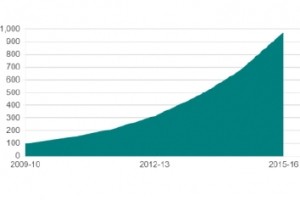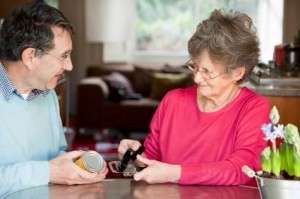A coalition of health experts have drawn up a strategy to tackle the UK’s general lack of exercise across the country. Supposedly, the health complications that arise from the issue costs the economy an estimated £20bn per year, with the loss of around 37,000 lives.
The government, along with the NHS and organisation UKactive have created ‘Blueprint for an Active Britain’ a strategy to see the Department of Health, Work and Pensions to take action across the NHS, social services, public transport and the workplace to create a more physically active approach on-going to tackle the issue. Changing the public’s habits ahead of future health complications is a top priority.
A key recommendation from the pilot scheme is to introduce a trained physical activity professional into each GP surgery to help patients improve fitness, cardio-respiratory and mental health. The care will be delivered similarly to that of GPs’ access to physiotherapists for patients in need.
The coalition claim that the minimal costs to introduce the scheme will quickly off-set the on-going costs to treat in-active health issues, in that prevention is easier, and in this case cheaper, than treatment.
Tanni Grey-Thompson, UKactive’s chair, and British Paralympic champion said “We know that physical activity programmes only attract around 4% of public health funding at present. This is much lower than funding to tackle alcohol abuse, obesity and STDs, despite physical inactivity contributing to more premature deaths. It’s vital that helping people to establish good exercise habits is central to the NHS’s core business.”
For more information on GP's Jobs available at Key locums, click here - http://www.keylocums.com/job-search
News in that GP trainees will now be offered £20,000 as an incentive payment take jobs in areas currently understaffed as part of a Health Education England initiative.
It’s estimated that 1 in 9 GP vacancies in England were unfilled in the East Midlands and the North East regions. In order to counter this, trainees will be offered incentives of £20K by the HEE, to take up jobs in the areas worst affected.
Maureen Baker, the RCGP chairperson welcomed the announcement, stating: ‘This initiative is something that the college has been proposing for some time, and we are pleased to see it being implemented,’
‘It is just one initiative in the 10-point-plan to build the GP workforce that the college launched last year with NHS England, HEE and the BMA and we will continue to work with the government and decision makers to "recruit, retain, return" the thousands more GPs necessary to keep our profession – and the wider NHS – sustainable.
Click here for GP Jobs - http://www.keylocums.com/job-search
With staff shortages on the rise, and posts being left vacant, research has been carried out by the Centre for Health Economics to find more about our GP’s education in the UK.
Based on the research results, less than a third (31%) of current UK-educated GP trainees attended private schools, the smallest representation of all medical specialties assessed. This compares to nearly half of all surgical trainees (44%), with 37% of medical trainees overall being privately educated.
69% of GP trainees are female, and the workforce looks to become more female-dominated in the coming years
Source: http://www.gponline.com/uk-gp-trainees-likely-state-education-specialties/article/1376133
The NHS in England is to allocate £112m of additional funding to generate an additional 1,500 Pharmacist jobs in GP practices by 2020, according to a recent announcement made by the Government.
The announcement forms part of theGovernment’s plan to invest a further £2.4bn a year in GP services for 2020 (see our recent blog - http://bit.ly/1NmSb3z).
The plan comes 5-months after the Government announced planned cuts to the pharmacy contract of £170m, which potentially could lead to the closure of up to 3,000 pharmacies up and down the Country.
The ‘General Practice Forward View’, published on April 21st 2016, stated that the success of general practices in the future would rely on the expansion of the wider non-medical workforce, including pharmacists, nurses and practice managers, to a minimum of 5,000 extra staff by 2020.
The NHS England wants to expand pharmacists working in GP surgeries to “enable every practice to access a clinical pharmacist across a minimum population on average of 30,000 – leading to an extra 1,500 pharmacists in general practice”.
The plan also states that the NHS England will open up the clinical pharmacist training programme to practices that have directly funded a clinical pharmacist
Ian Strachan, the chair of the National Pharmacy Association (NPA), stated: “Sustained investment in local pharmacies would be a far bigger stride towards opening up access and creating a world class health service.”
He added: “The community pharmacy network has to remain the core of pharmaceutical care in the community. There is already a highly qualified workforce in local pharmacies right across the country and a well-established infrastructure for delivering care in those settings. Community pharmacies are a ready-made solution on the health service front line, close to where people live, work and shop.”
Watch this space for future developments.
We're Counting Down to Pulse Live!
The team at Key Locums will be exhibiting at the Pulse Live GP exhibition at Olympia Conference Centre in London on 22nd & 23rd March!
We're looking forward to meeting many of our candidates who will be attending and many others who have not yet worked with us and discovered what we can do to help them.
Pulse Live is an exhibition held over the course of two days and made up of a series of seminars and workshops on subjects such as clinical, regulatory, practice business, and personal development, and all designed with GPs in mind.
If you'll be attending the show, don't forget to stop by stand 24 and meet our team PLUS take home one of our free goody bags!
We look forward to seeing you there!
For more information on Pulse Live visit http://www.pulse-live.co.uk/ or call our team on 020 8506 6010.
GIDS Find Rise in Gender Identity Referrals
Recent years have seen a large rise in the number of NHS referrals for children with gender identity issues.
According to GIDS (The Gender Identity Development Service), 969 under-18s in the UK were referred to the NHS between 2015 and 2016, which has increased from only 94 from between 2009 and 2010. Almost 200 of the under-18s most recently recorded were under 12 years old. The records also show that one three-year old and three four-year-olds were referred to GIDS.
Many of these statistics have been revealed following a recent case in Nottinghamshire, where a five-year-old boy came back to school identifying as a little girl. The child’s parents received professional support after making the difficult decision to help their son to become who he really felt he was and the school sent letters to classmates’ homes explaining the situation.
The Gender Identity Development Service receives most referrals from GPs, paediatricians, schools, and mental health services. Director, Polly Carmichael, supports the claim that gender transitions are becoming more frequent amongst younger children but stated there is no right or wrong approach.
GIDS have said that the rise in referrals could be because awareness of gender identity issues and acceptance of them has increased.
Bernard Reed of the Gender Identity Research and Education Society (GIRES) explained that young people still suffer in silence when it comes to gender issues. GIRES is a charity working to help those struggling with gender identity to improve their quality of life.
Reed said: ‘There are several hundred cases each year and they are quite often referred for medical support. But because society is often not supportive in such cases, usually these young people do not seek publicity.’
Source: BBC News
Recently published calculations have suggested that giving HIV drugs to healthy gay men on a daily basis could help to prevent new infections from taking hold.
The calculations, published in the Lancet, suggest that if daily drugs are administered to those with the highest risk of contracting HIV, the number of infected people could be cut by more than 40% in the UK.
Statistics show that gay men in London are at the highest risk of contracting HIV in the UK, with one in eight gay men living with the infection. The rest of the UK shows one in 26.
How can HIV contraction be prevented?
The simplest and one of the most effective methods of prevention is to use condoms. However, these are often ignored.
Studies show that by 2020, there will be 16,955 further cases of HIV in gay men. Tests carried out last year on 500 men examined the effects of an alternative prevention method – pre-exposure prophylaxis (Prep).
The tests showed that giving men Prep drugs for a year could prevent one case in 13. That is a staggering 7,399 cases of infection.
Medical Director of the Terrence Higgins Trust, Dr Michael Brady said: “This study is really important as it demonstrates that, in a relatively short space of time, Prep could have a dramatic impact on reducing HIV transmissions.”
Prep is being evaluated by the NHS to judge whether it should be administered.
Source: BBC Health
Season's Greetings From Key Locums!
The team at Key Locums would like to wish all of our candidates, clients, and friends a very Merry Christmas and Happy New Year!
2015 has been a big year for Key Locums. We were acquired by the Urban Recruitment Group and have opened up new branches in Central London and Essex. We hope 2016 sees continued growth and success for us, and with the support of our hard working candidates and clients we’re sure it will be a great year!
Wishing you a peaceful Christmas and a fantastic New Year!
The Key Locums Team
Flu Vaccinations on the Rise for 2015
Latest figures from PHE (Public Health England) show that the number of flu vaccines given to patients for free at their GP practice has risen this year in comparison to previous years.
Data provided by PHE and RCGP (Royal College of General Practitioners) previously suggested that the number of vaccines was declining, causing concern that the public may be avoiding the jab or visiting their local pharmacy for the vaccination instead.
The data shows a rise in vaccinations of 1.8% in pregnant women, 1% in age 65+ patients, and 0.5% in 2 year-old children. There has however, been a 2% decrease in vaccinations for patients under 65 years old with long term health conditions.
PHE are urging those with existing health conditions to receive the jab as this will prevent the virus from circulating.
Dr Richard Pebody, head of flu surveillance for PHE said:
‘It’s not too late for people in "at risk" groups to get the vaccine for free. This includes people with health conditions, even those that are well managed, such as asthma, diabetes, heart, lung, liver or renal diseases, those with weakened immune systems, as well as older people and pregnant women. Anyone in these groups who hasn’t yet had the vaccine should contact their GP, pharmacist or midwife.’
Featured jobs
LocumNurse PractitionersLancashire Details 19/02/2026 General Ward Nurse RGN - St Peters Hospital
PermanentGeneral PractitionersSurrey Details 19/02/2026 Registered Recovery nurse - Band 5 - in the Inverness region
LocumNurse PractitionersInverness Details










